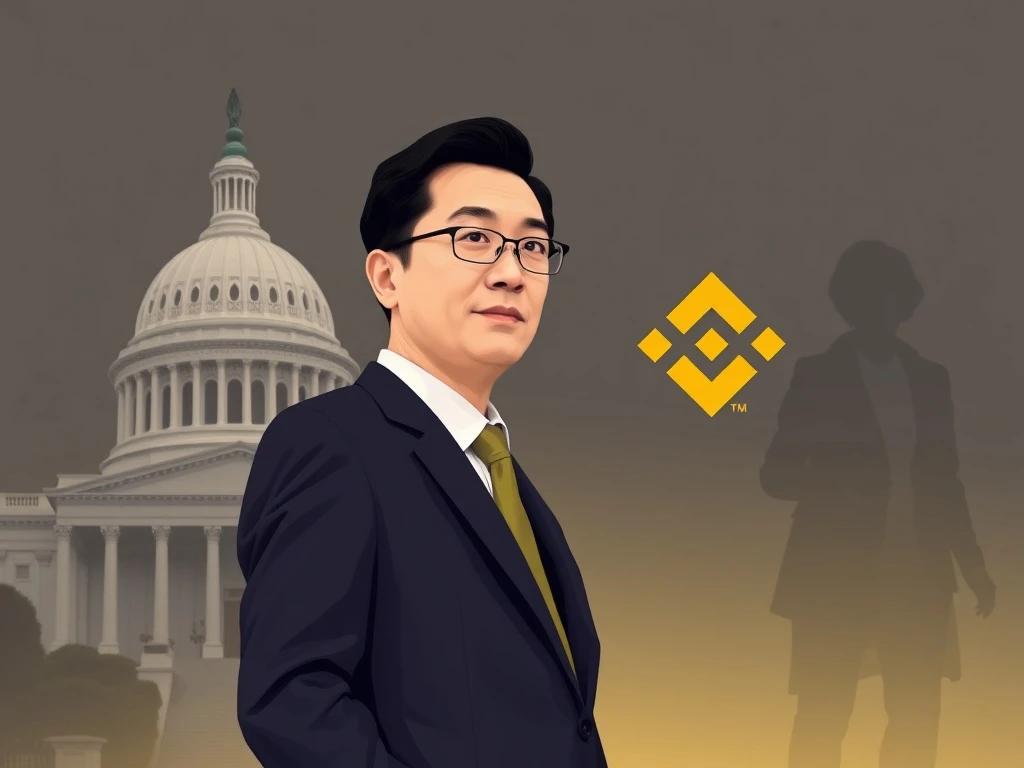CZ Binance Clarifies Charges, Debunking Senator Warren’s Money Laundering Claims

The cryptocurrency world recently witnessed a sharp exchange between CZ Binance, Changpeng Zhao, and prominent US Senator Elizabeth Warren. This debate ignited after Warren publicly claimed Zhao pleaded guilty to a “criminal money-laundering charge.” However, Zhao swiftly countered this assertion. He emphasized a critical distinction in his legal case. The former Binance CEO stated that his plea was not for money laundering itself. Instead, it involved failing to maintain an effective Anti-Money Laundering (AML) program at Binance. This nuanced clarification highlights the ongoing scrutiny of crypto regulation. It also underscores the importance of precise legal terminology in high-stakes public discourse.
Changpeng Zhao’s Plea: Understanding the Binance AML Violation
Changpeng Zhao clarified his legal situation following Senator Warren’s remarks. He took to X, stating, “There were NO money laundering [charges].” Zhao’s plea specifically addressed a single felony count. This count involved violating the US Bank Secrecy Act. The violation stemmed from his failure to maintain an effective Binance AML program. This distinction is crucial for understanding the legal context. It points to compliance failures rather than direct involvement in illicit financial transactions. In April 2024, Zhao received a four-month prison sentence for this offense. His recent presidential pardon, confirmed by Binance, further fueled public discussion. The pardon order was signed on Wednesday. This development has kept the spotlight firmly on the former CEO and the broader crypto industry.
Senator Elizabeth Warren Crypto Stance and Accusations
Senator Elizabeth Warren Crypto stance is well-known. She often advocates for stricter regulations in the digital asset space. Her recent comments about Zhao reflect this consistent position. Warren’s public statement claimed Zhao “pleaded guilty to a criminal money-laundering charge and was sentenced to prison.” This assertion directly led to Zhao’s strong rebuttal. Beyond the legal specifics, Warren also leveled accusations against former President Donald Trump. She alleged that Zhao “financed President Donald Trump’s stablecoin and lobbied for a pardon.” This accusation connects Zhao’s legal outcome to broader political narratives. It implies a potential quid pro quo scenario. Warren asserted, “If Congress does not stop this kind of corruption, it owns it.” Her remarks underscore a deep concern about the influence of crypto figures in politics. She believes such influence could undermine democratic processes. This perspective fuels the ongoing debate about transparency and accountability in the digital economy.
The Trump Crypto Pardon Connection and Political Fallout
The alleged link between Zhao and former President Trump Crypto Pardon adds another layer of complexity. Zhao himself previously stated he “wouldn’t mind a pardon” from Trump. This comment, made at the end of 2024, sparked considerable speculation. Senator Warren’s accusations directly reference this possibility. She implies a corrupt exchange. Furthermore, Warren’s remarks follow a Bloomberg report. This report linked Binance to the Trump-backed USD1 stablecoin. The article, which remains accessible, claims Binance developed the basic code for USD1. Critics cited in the report raised concerns about potential conflicts of interest for Trump. This situation suggests a blurring of lines between business interests and political influence. It highlights the growing entanglement of cryptocurrency with high-level politics. Reports also indicate an extraordinary increase in Trump’s personal wealth during his second term. This has reportedly generated over $1 billion in pre-tax profit. His son, Eric Trump, even suggested actual profits were “probably more.” Such financial gains intensify scrutiny of any perceived favors. The political fallout from these connections continues to unfold.
Binance AML Compliance: A Broader Regulatory Perspective
The discussion around Binance AML compliance extends beyond Zhao’s individual case. It reflects a wider regulatory push within the United States. Lawmakers like Representative Maxine Waters have echoed Senator Warren’s concerns. Waters, a top Democrat on the House Committee on Financial Services, released a strong statement. She claimed “Trump is doing massive favors for crypto criminals who have helped line his pockets.” Waters specifically mentioned Zhao. She stated his pardon was “an appalling but unsurprising reflection of his presidency.” She further accused Zhao of enabling money laundering and facilitating suspicious transactions. These transactions, she claimed, involved “child abusers, drug dealers, and terrorists.” Such powerful language indicates the severity with which some lawmakers view compliance failures in the crypto space. It emphasizes the perceived risks of inadequate AML frameworks. The focus on robust AML programs is a cornerstone of global financial regulation. Governments aim to prevent illicit funds from flowing through digital asset platforms. This ongoing regulatory pressure demands greater transparency and accountability from crypto exchanges worldwide.
The Semantic Battle: Money Laundering vs. Compliance Failure
Zhao’s insistence on the distinction between money laundering and AML program failure sparked a semantic debate. One X user accused him of “playing semantics.” This user argued the plea was “very much a money-laundering conviction.” However, Zhao firmly rejected this interpretation. He asserted that he accepted responsibility for compliance failures. He did not accept responsibility for directly laundering money himself. This distinction is legally significant. Money laundering involves actively concealing the origins of illegally obtained funds. An AML program failure, conversely, means an institution did not implement sufficient controls. These controls are designed to prevent money laundering. While both are serious offenses, they carry different implications. Zhao’s position highlights the importance of precise legal definitions. It also shows how these definitions are often interpreted differently in public discourse. The crypto industry grapples with establishing clear regulatory boundaries. Therefore, this debate over terminology remains central to its public perception and legal challenges.
The clash between Changpeng Zhao and Senator Warren underscores the intense regulatory scrutiny facing the cryptocurrency industry. It also reveals the complex interplay between legal definitions, political narratives, and public perception. As digital assets become more integrated into the global financial system, discussions around compliance, regulation, and political influence will undoubtedly intensify. The outcome of these debates will shape the future landscape of crypto. It will determine how digital assets are perceived and regulated by governments worldwide.







